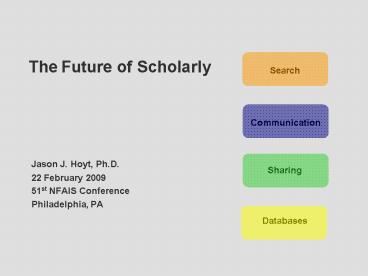The Future of Scholarly - PowerPoint PPT Presentation
1 / 43
Title:
The Future of Scholarly
Description:
Kayak.com Collective Intelligence. Kayak. Expedia. Travelocity. Southwest ... Kayak APIs let 3rd parties utilize collective intelligence even further with ... – PowerPoint PPT presentation
Number of Views:94
Avg rating:3.0/5.0
Title: The Future of Scholarly
1
The Future of Scholarly
- Jason J. Hoyt, Ph.D.
- 22 February 2009
- 51st NFAIS Conference
- Philadelphia, PA
2
What is a geneticist doing here?
3
Doctoral Research Lab Michele Calos,
PhD Stanford University
4
My Research
- Non-viral gene therapy - PhiC31 (?C31)
5
phiC31 integrase
pseudo attP
attB
transgene
donor plasmid
6
pseudo attP
transgene
attB
donor plasmid
7
pseudo attP
genomic DNA
donor plasmid
transgene
attB
8
attL
attR
transgene
genomic DNA
integrated donor plasmid
9
PhiC31 is more specific
Retrovirus
PhiC31
Human chromosome
10
But not specific enough
Me
Michele
(advisor discussion)
11
Zinc-Finger Transcription Factors(very
site-specific)
12
Molecular Scissors
PhiC31 catalytic domain
Zinc finger motif
Zinc finger motif
PhiC31 catalytic domain
Wu J. and Chandrasegaran S. (2007)
Custom-designed zinc finger nucleases What is
next? Cell. Mol. Life Sci. 642933-44.
13
Zinc-finger knowledge baseOverwhelming
14
Level of knowledge about zinc-fingers? Pretty
much zero
Then it gets worse
15
Zinc-Finger Learning Curve
Expert
Knowledge
Lot more than nothing
A bit more than nothing
Time
16
Zinc-Finger Learning Curve
Expert
Experiments
Visit a lab
Talk with the real experts (postdocs and senior
grad students)
Knowledge
Lot more than nothing
Talk with experts (Professors)
Attend talks/conferences/posters
Get frustrated when no access to primary paper
A bit more than nothing
Primary Literature
Reviews bias?
Time
17
Actions classified into four groups
Reviews primary literature
Email, Talks, Poster Sessions
Lab visits, knowledge shares
PubMed, spreadsheets, genome browser
18
Inefficient Use(Individual intelligence)
19
My former advisor and her doctoral advisor, Wally
Gilbert, did the same four things too
20
The expectation today is(Collective
Intelligence)
21
Individual Intelligence
Collective Intelligence
Available Information
Information Utilization
1950
2009
1980
22
Kayak.com Collective Intelligence
Travelocity
Southwest American United US Airways Virgin
America Alaska
Kayak
Expedia
In a single search the best price, travel time,
departure, or arrival can be prioritized across
multiple databases.
Kayak APIs let 3rd parties utilize collective
intelligence even further with your own
algorithms (e.g. coordinating multiple flights
with many people).
23
What tools can lead to collective intelligence
for researchers?
24
- Traditional Tools
- Talks
- Conferences
- Office hours
- Poster sessions
- Social hours
- Modern Tools
- Online forums
- Blogs
- VoIP (Skype)
- IM
- Twitter/Yammer
- RSS feeds
- Social networks
Modern Non-mainstream
25
- Traditional Tools
- PubMed
- Libraries
- Keyword searches
- (Google Scholar)
- Modern Tools
- Meta search engines
- Semantic search engines
- Recommendation engines
- Open text mining interface
- Collaborative efforts
- Wikipedia
Modern Non-mainstream
26
- Traditional Tools
- Journal Clubs
- PDFs
- Lab visits
- Modern Tools
- Offline/online syncing
- iTunes-like document shares
Modern Non-mainstream
27
- Traditional Tools
- Internal data stores
- Modern Tools
- Online databases
- Stanford microarray database
- BLAT/BLAST
- Yeast genome database
- Database mashups of disparate data
28
Caveat
- Traditional tools can be transformed into modern
collective intelligence tools - e.g. Individual PowerPoint documents in a
database could find correlations among
experiments or current primary literature.
29
State of traditional versus modern tool use?
30
Surveyed 100 graduate students and postdocs
- Stanford School of Medicine
31
Rate the importance of each of the following in
your day-to-day work
- Social Networks
- Wikipedia
- Science Blogs
- Open-access journals
- Semantic/meta search engines
- PubMed search
- Google search
- PDF organization/search on computer
- Sharing data/papers with colleagues
32
(No Transcript)
33
Rate how much each of the following needs
improvement
- Social Networks
- Wikipedia
- Science Blogs
- Open-access journals
- Semantic/meta search engines
- PubMed search
- Google search
- PDF organization/search on computer
- Sharing data/papers with colleagues
34
A lot
More than Some
Some
Not at all
35
Why do you feel social networks for researchers
are important/unimportant?
- Networking outside of lab for
- Jobs
- New ideas
- Protocols/Not reinventing the wheel
- Form collaborations
- Not mainstream enough to be useful
- Conferences are better for meeting people
36
Keyword versus Meta Search?
- Keyword Search
- Enter BRCA1 or Gene Therapy and the results
are presented as a list of articles - Meta Search
- Results are returned sorted into multiple
categories such as Latest literature,
Diseases, or Cures
37
Would meta search be more helpful than keyword
search?
38
Which do you think would benefit the world
community of researchers more?
Raw data and open responses www.ologeez.org/fina
l_survey.xls
39
Has this been accomplished?
40
Not yet- still not integrated
41
Emerging Web/Offline Tools
- Citeulike.org
- Labmeeting.com
- Epernicus.com
- ResearchGate.com
- Mendeley.com
- Academia.edu
- Nextbio.com
- Illumin8 (Elsevier)
- Ologeez.org
- Keys to Success
- Integrate traditionally individual tasks with the
crowd - i.e. Collective intelligence
- Crowd sourcing meta data from PDFs for hidden
information - The social aspect cannot be the core
42
Role of traditional players(publishers,
conference organizers, national databases)
- Work towards new business models that can sustain
open-access (PLoS) - In the meantime, provide better APIs and XML
formats for machine-readable search - OTMI
- Continue hosting these types of conferences
43
Acknowledgments
- Bonnie Lawlor Executive Director NFAIS
- Jill ONeill Director Communication NFAIS
- NFAIS conference planning committee
- Tina Moir, panel moderator RefWorks

